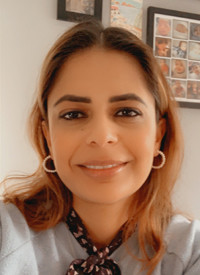

Science can supercharge your career
Great teachers set Amrit Teja, IT Operations Manager, on the path to a career that would see her explore genetics and biomedical science, before embarking on her latest role helping to shape National Grid’s digital future.
At my school there was never any sense that science was only for boys. On reflection, I was lucky – I attended a diverse, inner-city comprehensive school in Coventry, where I was taught by inspiring teachers who encouraged us all to get excited about science. They invited inspirational female scientists to speak to us, held competitions to drive creativity and the classes were fun.
My maths teacher was a huge influence on me. He was tough with a heart of gold. I didn’t have as much confidence in maths as I did in other subjects, but he saw my potential and supported me. His encouragement made all the difference. Of all the sciences, biology was my favourite subject – my teacher was an Asian woman like me and her classes inspired me to study genetics at university.
I received an unconditional offer from Manchester University. It was a prestigious course and only 10 students were accepted every year, so I was very excited. Unfortunately, when I got there I felt like an outsider. No one spoke like me and they were all from very different backgrounds – one girl had never met anyone non-white before. I was excited to meet new people, but I was treated differently. I didn’t feel like the atmosphere on the course was right for me to be productive.

Mixing business with science
I spoke to my tutor, who knew something was wrong. He was supportive and helped me to move and obtain a place to study Biomedical Science at Nottingham Trent University instead. I loved it there and thrived. I stayed on and completed a Masters in Management and Marketing to broaden my options – I wanted to gain business skills to combine with my scientific foundation.
I still wasn’t sure what I wanted to do. I considered becoming a teacher or a doctor but, while I was making my mind up, I began temping at National Grid.
Within nine months I’d been offered a permanent management role and a year later I moved up to a more senior role. The variety of work has kept me here – I have enjoyed moving around and working in different areas of the business. That’s why I’m still here, 17 years later.
The science of success
My scientific background has helped me from the outset. Many people view scientists in a stereotypical way and forget that science essentially tries to create solutions in life – just look at all the COVID vaccines that have been developed in the past 12 months. We are creative and innovative, we hypothesise, test boundaries and constantly review and refine. This makes us great problem solvers, resilient and full of ideas, all invaluable traits at work.
I have to say, I never thought I would end up in IT, but I love it. It’s fast paced, dynamic and very inclusive. My new role as Operations Manager working in ngDigital is exciting, as I am defining the framework we will use to deliver future digital products.
Science prepares you for anything
Science can prepare you for any role and that’s an important message. As the role that technology plays in our lives is increasing, the science, technology, engineering and maths (STEM) sector is growing and has evolved; it’s not all scientists in white lab coats (although we still need them). Future generations will be working in roles that are not even created or known of yet and, to be successful, we need a diverse workforce.
Future generations will be working in roles that are not even created or known of yet and, to be successful, we need a diverse workforce.
There’s never been a better time to have STEM skills. I would say to any girl and anyone with a passion for science … go for it. I would also add that it’s not just about young people, we need women at every stage in their careers to consider moving into the sector to help us power the STEM workforce of the future.


